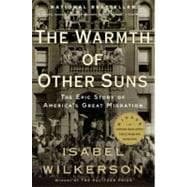
Note: Supplemental materials are not guaranteed with Rental or Used book purchases.
Purchase Benefits
What is included with this book?
| In The Land of the Forefathers | p. 1 |
| Leaving | p. 3 |
| The Great Migration, 1915-1970 | p. 8 |
| Beginnings | p. 17 |
| Ida Mae Brandon Gladney | p. 19 |
| The Stirrings of Discontent | p. 36 |
| George Swanson Starling | p. 47 |
| Robert Joseph Pershing Foster | p. 72 |
| A Burdensome Labor | p. 95 |
| The Awakening | p. 124 |
| Breaking Away | p. 165 |
| Exodus | p. 181 |
| The Appointed Time of Their Coming | p. 183 |
| Crossing Over | |
| The Kinder Mistress | p. 223 |
| Chicago | p. 225 |
| New York | p. 227 |
| Los Angeles | p. 230 |
| The Things They Left Behind | p. 238 |
| Transplanted in Alien Soil | p. 242 |
| Divisions | p. 260 |
| To Bend in Strange Winds | p. 285 |
| The Other Side of Jordan | p. 302 |
| Complications | p. 332 |
| The River Keeps Running | p. 351 |
| The Prodigals | p. 364 |
| Disillusionment | p. 371 |
| Revolutions | p. 385 |
| The Fullness of the Migration | p. 413 |
| Aftermath | p. 433 |
| In the Places They Left | p. 435 |
| Losses | p. 445 |
| More north and West than South | p. 455 |
| Redemption | p. 465 |
| And, Perhaps, to Bloom | p. 481 |
| The Winter of Their Lives | p. 491 |
| The Emancipation of Ida Mae | p. 516 |
| Epilogue | p. 527 |
| Notes on Methodology | p. 539 |
| Afterword | p. 545 |
| Acknowledgments | p. 547 |
| Notes | p. 555 |
| Index | p. 589 |
| Permissions Acknowledgments | p. 621 |
| Table of Contents provided by Ingram. All Rights Reserved. |
The New copy of this book will include any supplemental materials advertised. Please check the title of the book to determine if it should include any access cards, study guides, lab manuals, CDs, etc.
The Used, Rental and eBook copies of this book are not guaranteed to include any supplemental materials. Typically, only the book itself is included. This is true even if the title states it includes any access cards, study guides, lab manuals, CDs, etc.